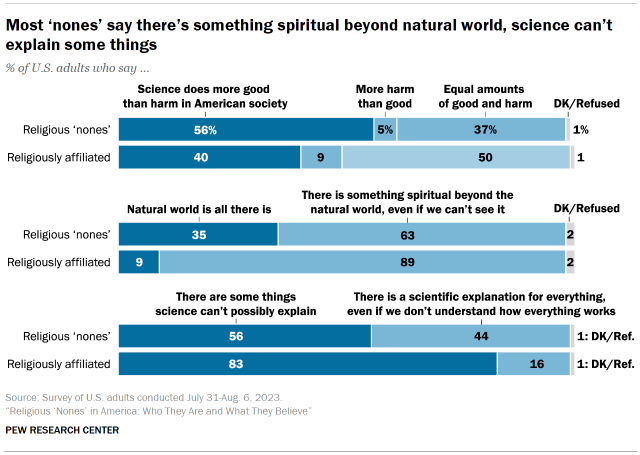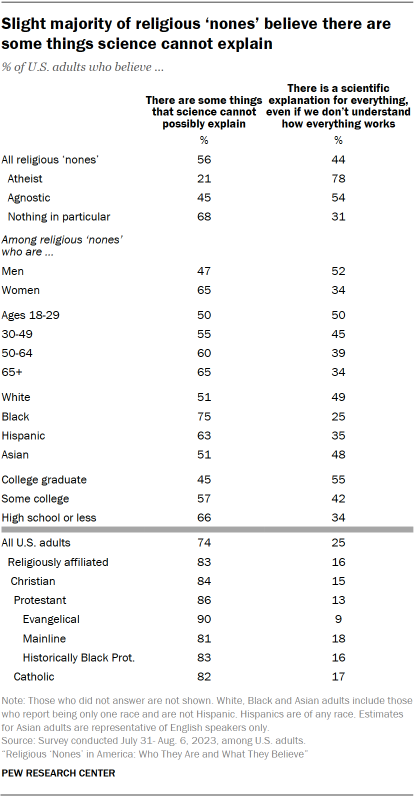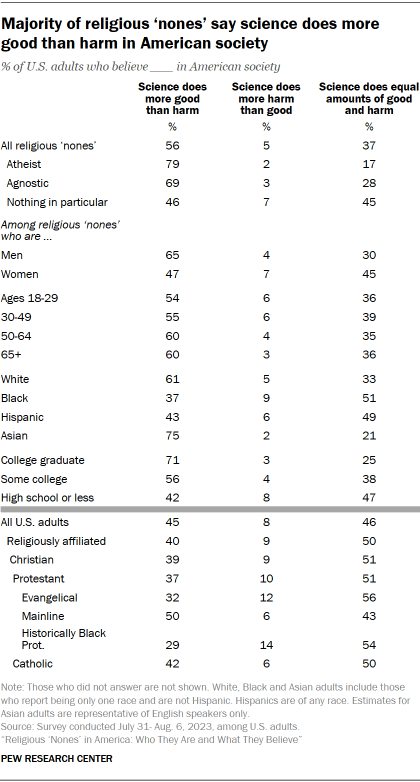Compared with U.S. adults who identify with a religion, “nones” have a more positive view of science. At the same time, most “nones” say that there are some things science cannot explain and that there’s something spiritual beyond the natural world, even if we cannot see it.
In our survey, 56% of “nones” say they think science does more good than harm in society, which is 16 percentage points higher than the share of religiously affiliated adults who take that position.

Religious “nones” are also far more likely than people who identify with a religion to say the “natural world is all there is” and “there is a scientific explanation for everything, even if we don’t understand how everything works.”
Still, most “nones” don’t think the natural world is “all there is” – 63% of “nones” say “there is something spiritual beyond the natural world, even if we cannot see it.” And 56% of “nones” say there are some things that science just can’t explain.
Views on whether science explains everything

When asked to select which of two statements comes closer to their own view, a slight majority of “nones” (56%) choose “there are some things that science cannot possibly explain,” while 44% pick “there is a scientific explanation for everything, even if we don’t understand how everything works.”
Roughly eight-in-ten atheists say there is a scientific explanation for everything, compared with 54% of agnostics and 31% of those who describe their religion as “nothing in particular.”
Among the unaffiliated, men are more likely than women to say there is a scientific explanation for everything. And White and Asian “nones” are more likely than Hispanic or Black “nones” to say this.
Over half of “nones” who are college graduates say science offers an explanation for everything (55%), compared with a third of “nones” with a high school diploma or less education (34%) who say this.
Views about impact of science on society

A slight majority of religiously unaffiliated adults (56%) say science does more good than harm in society. Just 5% say science does more harm than good, and 37% say science does equal amounts of good and harm.
Among atheists, 79% say science does more good than harm in society, while 69% of agnostics take the same position. Fewer Americans who describe their religion as “nothing in particular” say science does more good than harm.
Unaffiliated men are more likely than unaffiliated women to say science does more good than harm. And unaffiliated adults who are college graduates express more positive views of science compared with those who have less education.
Majorities of Asian and White “nones” say science does more good than harm. Fewer Hispanic and Black “nones” say the same.
Return to the report’s Overview.
Find answers to other questions:
- Who are the ‘nones’? How are they defined? (Chapter 1)
- Why are ‘nones’ nonreligious? (Chapter 2)
- Are ‘nones’ less involved in civic life than people who identify with a religion? (Chapter 3)
- Are all ‘nones’ nonbelievers? (Chapter 4)
- Are ‘nones’ spiritual instead of religious? (Chapter 5)
- Are ‘nones’ hostile toward religion? (Chapter 6)
- How do ‘nones’ think about morality? (Chapter 8)




